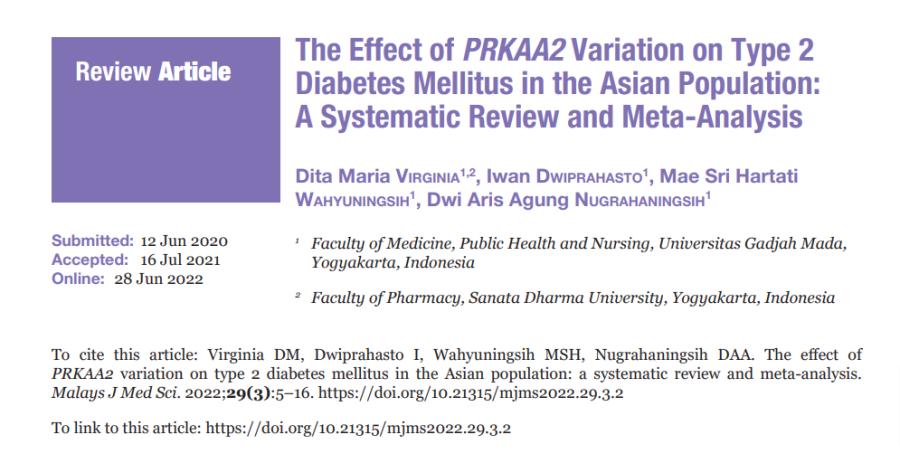
- Download 68
- File Size 462.15 KB
- File Count 1
- Create Date July 5, 2022
- Last Updated July 5, 2022
Abstract:
The prevalence of type 2 diabetes mellitus (T2DM) is increasing among Asians. The adenosine monophosphate-activated protein kinase (AMPK) increases T2DM risk through insulin resistance. Glucose levels are related to AMPK subunit α2 encoded by PRKAA2. This systematic review and meta-analysis aimed to analyse the association between PRKAA2 variation and T2DM risk. Publication search related to PRKAA2 and T2DM used PubMed, ProQuest, and ScienceDirect databases. Article selection based on inclusion and exclusion criteria only included Japanese and Chinese populations. This meta-analysis used five genotype models to estimate the effect of PRKAA2 variation and T2DM risk. Additionally, a fixed-effect model was selected to measure the pooled size effect if P > 0.05 or I2 < 50%. Qualitative analysis included four eligible studies, and meta-analysis included only two studies because both showed data concerning rs2746342 variation. Patients with G allele are 1.45 times more likely to have T2DM than patients with T allele (95% confidence interval [CI]: 1.20, 1.76; P: 0.0001). Notably, patients who had GG genotype have 1.96 times higher risk of T2DM compared with those with TT genotype (95% CI: 1.34, 2.87; P: 0.0005), dominant model (odds ratio [OR]: 1.75; 95% CI: 1.32, 2.31; P: 0.001), and recessive model (OR: 1.43; 95% CI: 1.01, 2.01; P: 0.04). PRKAA2 variation, especially in rs2746342, has an association with T2DM risk in the G allele, additive, dominant, and recessive models. G allele might be the most contributable factor in increasing T2DM susceptibility.
Keywords: AMP-activated protein kinase, genetic variation, type 2 diabetes mellitus, risk factor, Asian


